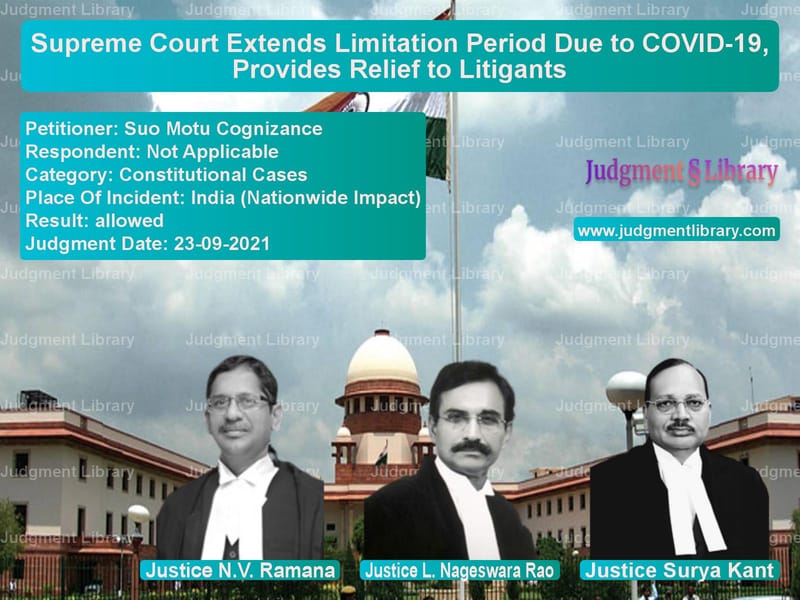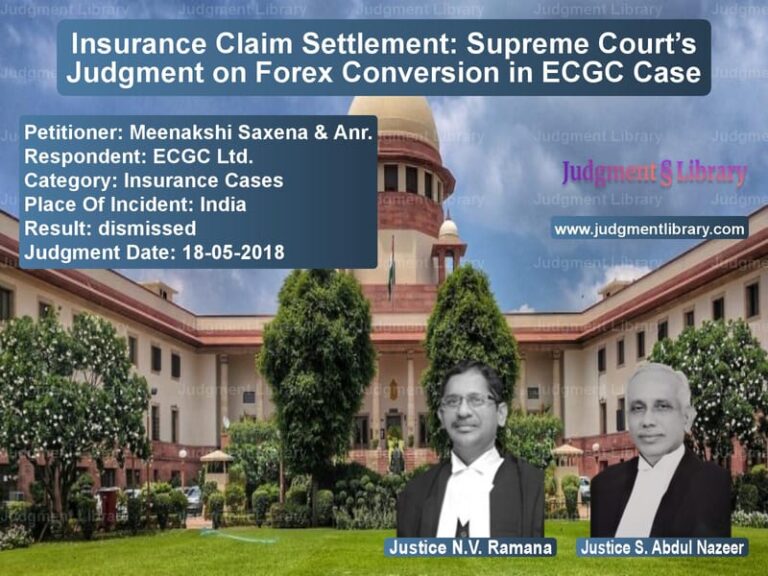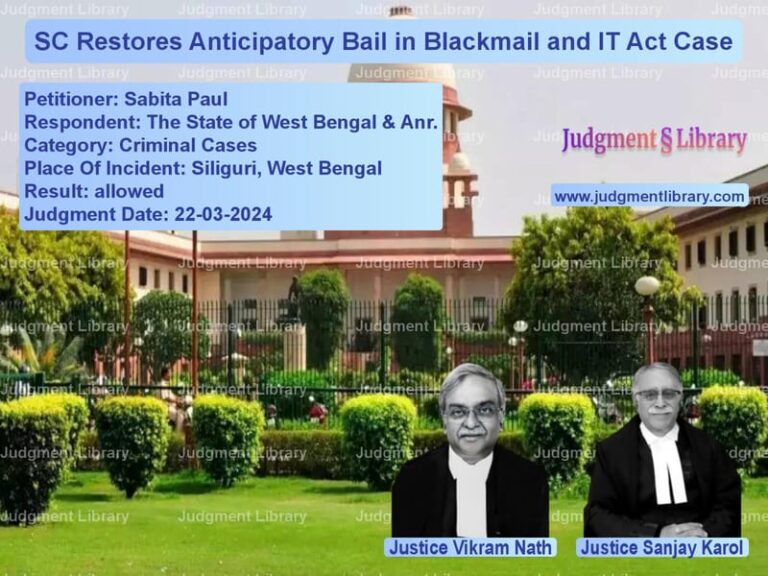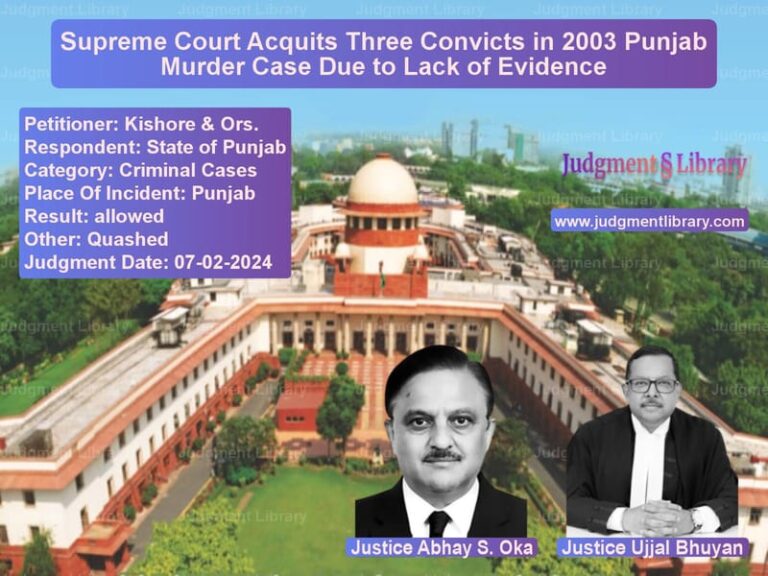Supreme Court Extends Limitation Period Due to COVID-19, Provides Relief to Litigants
The Supreme Court of India, in the case of In Re: Cognizance for Extension of Limitation, addressed the impact of the COVID-19 pandemic on the judicial process. Recognizing the challenges faced by litigants, the Court extended the limitation period for filing suits, appeals, applications, and proceedings before various courts and tribunals across the country. This judgment provides significant relief to litigants who were unable to approach courts due to the restrictions imposed during the pandemic.
Background of the Case
With the outbreak of COVID-19 in March 2020, courts across India faced challenges in conducting hearings and accepting new cases. To ensure that litigants did not suffer due to procedural delays, the Supreme Court took Suo Motu cognizance and passed an order on March 23, 2020, extending the limitation period for all judicial and quasi-judicial proceedings.
Key orders passed by the Supreme Court regarding the limitation period:
- March 23, 2020: The Court directed that the period of limitation for all legal proceedings shall stand extended with effect from March 15, 2020, until further orders.
- March 8, 2021: The Court partially lifted the extension, directing that the period from March 15, 2020, to March 14, 2021, be excluded while computing limitation.
- April 27, 2021: Due to the second wave of COVID-19, the Court restored the extension of limitation and excluded the period from March 15, 2020, till further orders for all legal proceedings.
- September 23, 2021: The Court finally concluded the extension, setting a new limitation framework effective from October 3, 2021.
Key Legal Issues Considered
1. Impact of COVID-19 on the Judicial System
The Supreme Court observed that the pandemic had severely disrupted court operations and made access to legal remedies difficult for litigants:
“The extraordinary situation caused by the sudden and second outbreak of COVID-19 requires extraordinary measures to minimize the hardship of litigant–public in all states.”
2. Applicability of the Extension
The extension applied to all legal proceedings, including suits, appeals, applications, and special laws prescribing limitation periods. The Court directed that the limitation period be extended under:
- Section 23(4) and Section 29A of the Arbitration and Conciliation Act, 1996
- Section 12A of the Commercial Courts Act, 2015
- Provisos (b) and (c) of Section 138 of the Negotiable Instruments Act, 1881
- All other statutes prescribing limitation periods
3. Binding Nature of the Order
The Court, exercising its power under Article 142 read with Article 141 of the Constitution of India, made it clear that its order would be binding on all courts, tribunals, and authorities across the country.
“We have passed this order in exercise of our powers under Article 142 read with Article 141 of the Constitution of India. Hence, it shall be a binding order within the meaning of Article 141 on all Courts/Tribunals and Authorities.”
Final Judgment and Directions
On September 23, 2021, the Supreme Court issued the following final directions:
- In computing the period of limitation for any suit, appeal, or application, the period from March 15, 2020, to October 2, 2021, shall be excluded.
- In cases where the limitation would have expired between March 15, 2020, and October 2, 2021, litigants would get an additional 90 days from October 3, 2021.
- In cases where the actual balance period of limitation available was greater than 90 days, that longer period shall apply.
- The period from March 15, 2020, to October 2, 2021, shall also be excluded while computing limitation under the Arbitration and Conciliation Act, the Commercial Courts Act, and the Negotiable Instruments Act.
- The Government of India shall amend guidelines for containment zones to allow regulated movement for legal, educational, and job-related requirements.
Implications of the Judgment
1. Relief for Litigants Affected by the Pandemic
The ruling ensures that individuals and businesses whose legal rights were affected due to COVID-19 restrictions are not penalized for procedural delays.
2. Uniformity Across the Legal System
By applying the extension across all courts and tribunals, the Supreme Court has ensured a uniform approach to limitation laws in India.
3. Clarity for Arbitration and Commercial Litigation
The exclusion of the pandemic period from limitation calculations under the Arbitration and Conciliation Act and the Commercial Courts Act benefits businesses engaged in contractual disputes.
4. Strengthening Judicial Review
The Court’s exercise of Article 142 powers reinforces its commitment to ensuring justice by addressing extraordinary situations.
Conclusion
The Supreme Court’s decision in In Re: Cognizance for Extension of Limitation is a landmark ruling that recognizes the unique challenges posed by the COVID-19 pandemic. By extending limitation periods and ensuring clarity in legal timelines, the Court has provided relief to countless litigants affected by the crisis. This judgment will serve as an important precedent in future cases where external factors disrupt access to justice.
Petitioner Name: Suo Motu Cognizance.Respondent Name: Not Applicable.Judgment By: Justice N.V. Ramana, Justice L. Nageswara Rao, Justice Surya Kant.Place Of Incident: India (Nationwide Impact).Judgment Date: 23-09-2021.
Don’t miss out on the full details! Download the complete judgment in PDF format below and gain valuable insights instantly!
Download Judgment: suo-motu-cognizance-vs-not-applicable-supreme-court-of-india-judgment-dated-23-09-2021.pdf
Directly Download Judgment: Directly download this Judgment
See all petitions in Fundamental Rights
See all petitions in Public Interest Litigation
See all petitions in Legislative Powers
See all petitions in Separation of Powers
See all petitions in Judgment by N.V. Ramana
See all petitions in Judgment by L. Nageswara Rao
See all petitions in Judgment by Surya Kant
See all petitions in allowed
See all petitions in supreme court of India judgments September 2021
See all petitions in 2021 judgments
See all posts in Constitutional Cases Category
See all allowed petitions in Constitutional Cases Category
See all Dismissed petitions in Constitutional Cases Category
See all partially allowed petitions in Constitutional Cases Category







